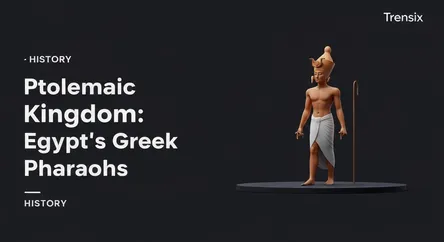History
Ptolemaic Kingdom: Egypt's Greek Pharaohs

Discover the Ptolemaic Kingdom, a Hellenistic dynasty founded by Alexander the Great's general that ruled Egypt for nearly 300 years.
What is it?
The Ptolemaic Kingdom was a Hellenistic state based in Egypt, founded in 305 BC by Ptolemy I Soter, a Macedonian Greek general and companion of Alexander the Great. After Alexander's death, his vast empire was divided among his generals, and Ptolemy secured control of Egypt. The Ptolemaic dynasty was the last to rule ancient Egypt before its annexation by Rome in 30 BC following the death of the famous final queen, Cleopatra VII. The kingdom's capital, Alexandria, became a major center of Greek culture, learning, and trade, home to the renowned Library and Lighthouse of Alexandria.
Why is it trending?
The Ptolemaic era remains a topic of fascination due to its unique blend of Greek and Egyptian cultures, a phenomenon known as Greco-Egyptian syncretism. The Ptolemies presented themselves to the native population as traditional pharaohs while maintaining a Greek-style court and administration in Alexandria. The dynasty's dramatic history, filled with family rivalries, political intrigue, and sibling marriages, continually captures public interest. The final ruler, Cleopatra VII, and her relationships with Roman leaders Julius Caesar and Mark Antony, is an enduringly popular story that cemented the kingdom's place in history and popular culture.
How does it affect people?
The Ptolemaic Kingdom's legacy profoundly impacted society. The Greek ruling class established a social hierarchy, placing themselves in top administrative and military roles, while native Egyptians largely continued their lives as peasant farmers. However, Greeks who settled in Egypt brought new agricultural techniques and crops, boosting the economy. The government established a sophisticated bureaucracy to manage the land's resources efficiently, making Egypt the wealthiest of the Hellenistic kingdoms. Alexandria became a beacon of intellectual life, fostering significant advancements in science, mathematics, literature, and medicine that influenced subsequent civilizations for centuries.